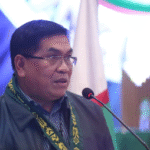
IPINASA sa second reading ng Senado noong Lunes ang panukalang batas para sa pagbuo ng trust fund ng coconut farmers sa bansa sa pamamagitan ng pagbebenta ng assets na nabili gamit ang coco levy fund.
Sa ilalim ng Senate Bill No. 1396 o ng “Coconut Farmers and Industry Trust Fund Act,” inaatasan ang pamahalaan na ipagbili ang P75 bilyong coconut levy assets sa susunod na limang taon upang makabuo ng trust fund para sa coconut farmers.
Sinabi ni Sen. Cynthia Villar, chairperson ng Committee on Agriculture, Food and Agrarian Reform at principal sponsor ng panukalang batas na kapag naisabatas ito, mabibiyayaan nito ang may 3.5 million coconut farmers mula sa 68 coconut producing provinces. Ang mga ito na may-ari ng hindi tataas sa 5 ektaryang sakahan ay kabilang sa pinakamahirap na sektor sa bansa.
“The coconut farmers are the poorest in the country. They earn only about P1,500 a month. This fund which rightfully belongs to the coconut farmers, should be plowed back to them for their own direct benefit,” ayon kay Villar.
Inaasahan na ipapasa ng Senado sa third at final reading ang coconut levy bill sa kanilang sesyon sa Miyerkules.
Kumpiyansa rin si Villar na agaran itong maisasabatas dahil natugunan na ang ‘concerns’ sa dating na-veto na bersyon ng panukalang batas.
Ayon kay Villar, kapag naisabatas, agad na ililipat ng Bureau of Treasury ang P10 billion sa trust fund; P10 billion sa second year; P15 billion, third year; P15 billion, fourth year; at P25 billion sa fifth year.
Kapag naisabatas, gagamitin ang P5B trust fund sa mga sumusunod na programa bukod sa mga programa ng PCA na bibigyan ng hiwalay na budget.
• 15% sa pagtatanim at replanting ng hybrid coconut seedlings at produksyon ng hybrid coconut seedlings ng Philippine Coconut Authority;
• 5 percent sa research at produksyon ng hybrid coconut seedlings ng Department of Science and Technology – Philippine Council for Agriculture, Aquatic and Natural Resources Research and Development (DOST-PCAARRD);
• 8 percent sa training ng coconut farmers at kanilang pamilya na nasa listahan ng coconut farmers registry sa farm schools sa ilalim ng Technical Education and Skills Development Authority atAgricultural Training Institute;
• 5 percent sa research, marketing at promotion ng Bureau of Micro Small and Medium Enterprise Development sa ilalim ng Department of Trade and Industry;
• 10 percent na equal na gagamitin sa farm improvements sa diversification at intercropping ng livestock, dairy, poultry, coffee at cacao production ng National Dairy Authority at Department of Agriculture; Native Animal Program at High Value Crop Program na equal na paghahatian;
• 10 percent sa shared facilities sa processing ng Philippine Center for Postharvest Development and Mechanization (PHilMech) na ibibigay sa mga kooperatiba. Kung walang kooperatiba sa isang bayan, ibibigay ito sa LGUs;
• 5 percent para sa pag-organisa at pagpapalakas sa coconut farmer organizations at kanilang kooperatiba sa ilalim ng Cooperative Development Authority;
• 10 percent na pantay na paghahatian para sa credit programs ng Development Bank of the Philippines at ng Land Bank of the Philippines;
• 10 percent sa infrastructure development na ipatutupad ng Department of Public Works and Highways sa coconut producing LGUs;
• 8 percent sa Scholarship programs ng mga magsasaka at kanilang pamilya na ipatutupad ng Commission on Higher Education;
• 10 percent sa health at medical programs ng mga magsasaka at kanilang pamilya na ipatutupad ng ahensiya na binuo ng Philippine Coconut Authority;
• 4 percent sa crop insurance na ipatutupad ng Philippine Crop Insurance Corporation.
Sa ilalim ng panukala, muling bubuuin ang Philippine Coconut Authority Board na kinabibilangan ng mga kalihim ng Department of Trade and Industry, Budget and Management Finance, DOST at PCA, at tatlong farmer-representatives mula sa Luzon, Visayas at Mindanao.









More Stories
VAPESHOP SA ANTIPOLO HINOLDAP GAMIT ANG DOS-POR-DOS NA KAHOY
Ilang insidente, naitala sa Wattah Wattah Festival 2025 sa San Juan
Sarah Lahbati, nali-link sa anak ni House Speaker Romualdez